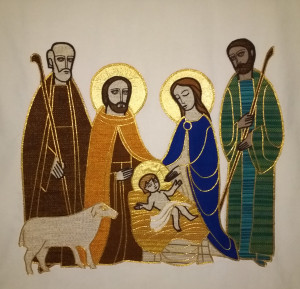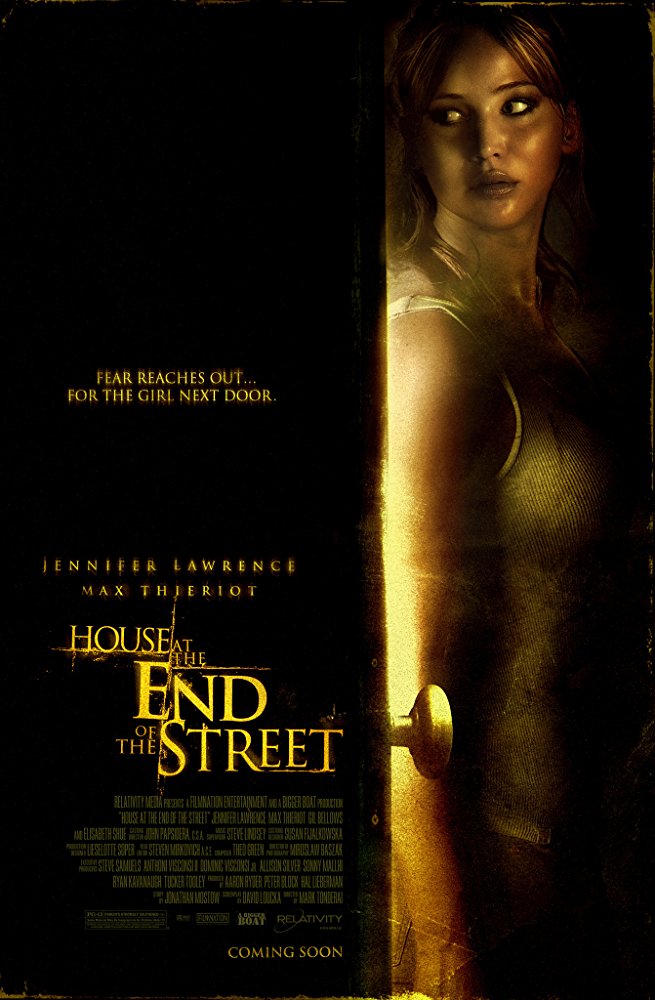
Detail from Trinity’s altar cloth showing the Holy Family and shepherds.
Epiphany of Our LordEvery day some brave and/or foolish people leave behind everything and everyone they know in order to seek a new and better life—a new land, a new opportunity. Sometimes they come to study or to seek employment. Sometimes they come fleeing danger or poverty. Some come feeling sure of themselves and some come hanging on by a thread.
I’m not sure whether the travelers we always refer to as the Magi or Wise Men couldn’t just as correctly be called the Brave Ones. They were probably astrologers who came by camel from “the east,” an area we think included modern-day Iraq, distinctly different in culture, language, and religion from Jerusalem. They did not make the journey because they were invited, or because they were visited by singing angels. They were not refugees, nor escaping poverty—as we can guess by the expensive gifts they brought along with them. They embarked on their lengthy and dangerous trip because the stars told them to. All I can think of is “Why?” What persuaded them to do it? What did they expect to gain that made it seem worthwhile to load up their camels and kiss their wives goodbye and ride off to seek a foreign king?
It’s once I started asking questions like these that I began to wonder whether these magi were wise or deluded. Did they realize that if they actually found what they were seeking, it would change everything about their lives? They were not Jewish by heritage or religion. They were distinctly foreign. Did they know that when they returned home, they would have to rethink how they worshiped and spent their money and treated their employees? If they knew what was at stake would they have made the journey at all?
I’m in awe of their willingness to embrace so much risk, so much newness. Apparently they were unafraid to face the truth, even if discovering it would nullify their former convictions. It’s definitely brave, if not wise.
I do find it gratifying that the magi didn’t have it ALL figured out. They had preconceived notions about kings, and where they might expect to encounter one. They presented themselves at the palace of King Herod, a puppet ruler appointed by the Roman Emperor to keep the rabble in order. But the baby Jesus was not there.
You might remember the Christmas song “Do You Hear What I Hear?” in which a king hears about the birth of the Christ child. His reaction is quite different from how Herod reacts to the news in Matthew’s Gospel. In the song, the king says to people everywhere: “Listen to what I say: pray for peace, people everywhere. A child, a child, born to us this night, he will bring us goodness and light.’”
In the Biblical account, Herod tells the wise men where his advisers think this child might be, begging them to come back after they find the baby so that he also might go and pay homage. When they do not return because an angel warns them not to, King Herod orders his soldiers to kill every Jewish boy under the age of two—since any one of them might be this spectacular baby. There was no room in Herod’s heart or head or throne-room for any threats to his authority. He needed to be sure he was eliminating his competition.
It’s tragic to me that the most realistic part of this whole story is King Herod’s cowardly behavior. Unlike the courageous, inspiring conduct of the magi, Herod behaves in a way that makes sense. In our world, when powerful people are threatened, they often do what they can to destroy the opposition. They react to challengers with violence and bullying. It can look like domestic abuse, war, rival gangs, revenge killings, or mass shootings. All of these forms of violent domination are about someone who is scared doing whatever they can to preserve their sense power over others.
We don’t have to try to imagine those petrified families in Bethlehem, cowering as Herod’s soldiers broke down their doors and slaughtered their babies. All we have to do is open the newspaper or watch TV. Images of sobbing refugees running with their babies in their arms, of parents bending over their children’s dead bodies on city streets or playgrounds from Palestine to Chicago, from Ferguson to Aleppo, from Baghdad to Madison—the same horrific scene seems to play on a continuous loop. Mothers mourn children blown to bits by bombs or perfectly-legal-but-badly-employed guns. Babies die in their father’s arms for lack of proper nutrition, vaccinations, or clean drinking water. Herod’s army is everywhere, still storming the lands, still destroying children while the rich get richer, the strong get stronger, and vulnerable children die in the crossfire. It is infinitely worse when we bear in mind that, to a great extent, our tax dollars help fund this nightmare.
The Bible tells us that in a dream Joseph is warned to flee from Herod’s massacre; he and Mary take Jesus and flee to Egypt. How would it impact our personal or corporate conduct if we saw the face of Jesus and his parents on the faces of refugees in the news? Like all dreamers, Joseph and Mary took a chance on a place far away, where they would be conspicuously “other,” possibly feared or distrusted because of their clothes, their language, their culture. They decided it would be worth all the risks and challenges if it would protect the baby they love—the baby that grew up to change the world. How many other refugee families might be nurturing a world-changing child? Are we brave enough to stand beside them?
The magi did. Or rather, they knelt rather than stood by the refugee baby. Though they did not find Jesus in the palace where they expected him to be, the magi recognized they’d reached their destination when they looked into the eyes of a defenseless baby and those of his humble parents. That they were willing to accept the truth when it presented itself, even though it did not resemble the hypothesis they’d set out with, is why we call them wise. Herod could never understand it, and many other people still don’t. Too many religious and/or political big shots want Jesus to be the kind of leader who shows others he’s boss. They forget that God’s power is not like human power. They forget Mary’s song about the proud being brought down low while the humble are raised up.
When King Jesus grew up, he did not rule like any other king. Jesus killed no one. Instead, he wandered the countryside, raising the dead, providing healthcare to the sick, comforting the grieving, feeding the hungry. He befriended the excluded ones, taught the ignorant, and welcomed the strangers. Instead of a trail of blood, he left light and hope and dignity in his path. He cautioned his followers not to return insult for insult, but to pray for their enemies, to do good to those who persecuted them. He urged all who would hear him not to store up treasures here on earth, but to take care that their souls were nourished. It sounds like absolute foolishness by our society’s standards; it might even make some people wonder why the magi didn’t leave behind some wisdom instead of frankincense.
When Jesus finally died, executed by an unholy partnership of church and state, he died under a sign that read King of the Jews. I wonder if the magi knew what happened to that King they worshiped decades before. I wonder if they knew Jesus called his followers to live not by force, but by love; not by ruling over, but by serving; not by controlling, but by offering up everything for the sake of others. I wonder how they lived after they saw the Light.
And I wonder: how will we live, having seen the light of that Bright Morning Star? Do we have the courage to follow the Light, even if we aren’t sure where we are being led or what might be asked of us when we arrive? Are we wise enough to seek God, not where we think a mighty God should be, but in the pain-ridden, bloody, dark corners of the earth? And if we find God doesn’t resemble us, doesn’t reflect our ideas about who God should be, will we know what we have seen? And will we have the courage to kneel?
When we recognize God in those moments, such insight can be called Epiphanies. But just as often, we may not get it. We might not even try. Still, my friends, there is Good News. Hear this: whether or not we know how or where to find Jesus, whether or not we are even seeking Jesus, daily Jesus seeks us. Daily Jesus offers to us his whole self, his body and blood, his Word, his presence, his promises. Daily God bends over us to whisper, “You are my beloved child. With you I am well pleased.” Daily, the Holy Spirit blows through our lives, making it possible for us to try again. In the strangest ways—a star or a dream or a baby or a refugee family or thirst for truth—God sends us invitations and opportunities to open ourselves up, to be renewed, strengthened, transformed, and enriched.
“Arise, shine, for your light has come.” We are called to raise our hearts and hands and voices for the alleviation of the suffering of God’s children all over the world. We are called to protect the vulnerable and to welcome the stranger. We have a story to tell, a journey to make, and so, so much to learn! Let’s follow the magi, so rich in courage, generosity, and faith, so blind to racial and religious divisions, so confused about power. Let’s learn from strangers how to grow in wisdom, how to listen to the angels and ponder the stars, how to offer our treasures to the unlikely Prince of Peace. Let us learn from King Jesus how to exercise our power rightly and how to live the truth.
Amen.
~Pastor Susan Schneider
Share this:




